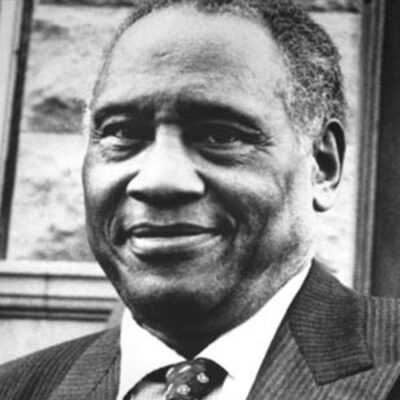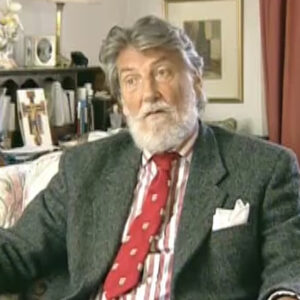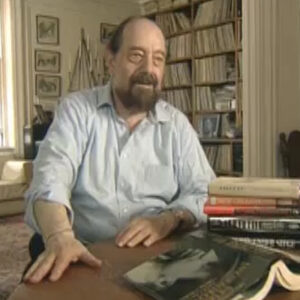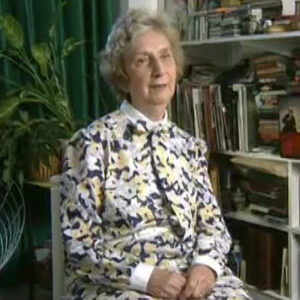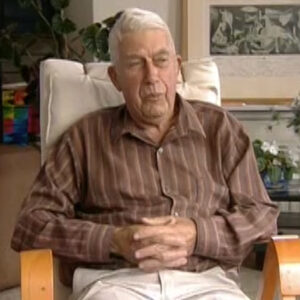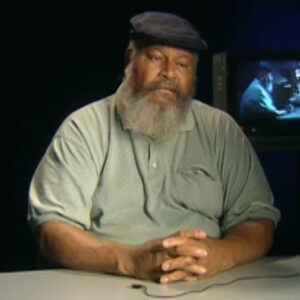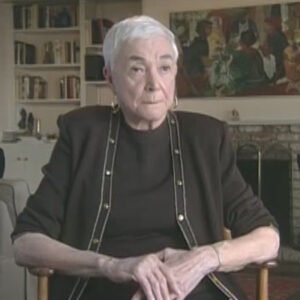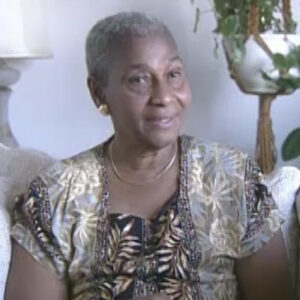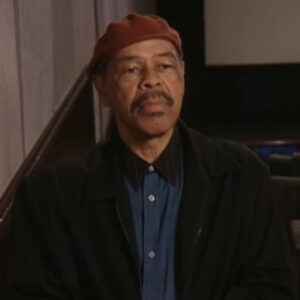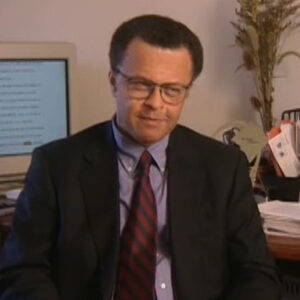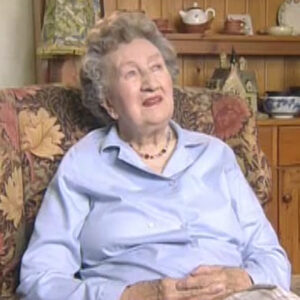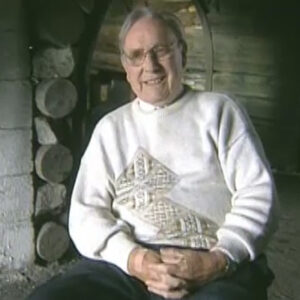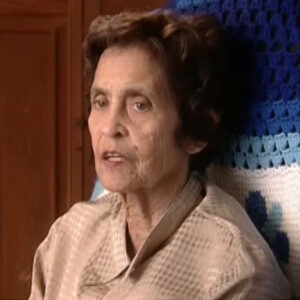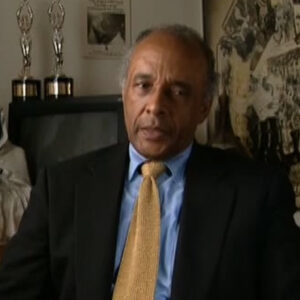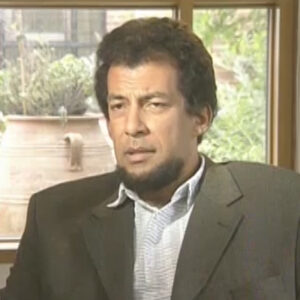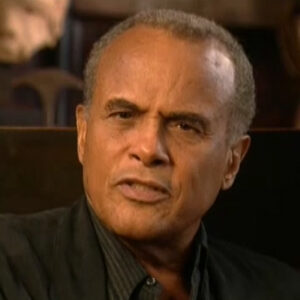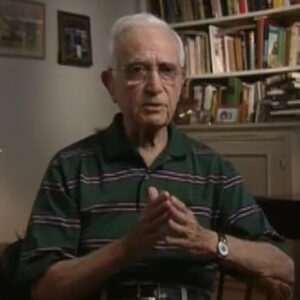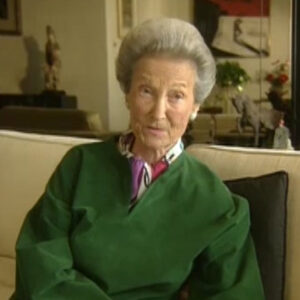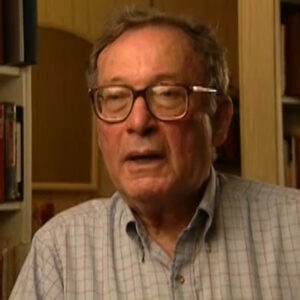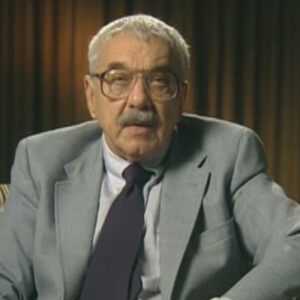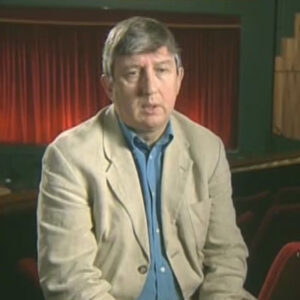Speaker I know my family wasn’t an activist, my mother was a woman who had definite principles. I knew what she believed. So I think I grew up in a home where there was just sort of understood what our attitude was about social issues.
Speaker And I went to a summer camp that had a progressive will run by a progressive group of people.
Speaker And so I absorbed certain the values of the camp. And that really was my my background, I would say my family was lower, middle class Jewish, lived in Queens.
Speaker The neighborhood was segregated by the time you got to let me know when it’s.
Speaker OK, I’m sorry. Yeah, so OK, so, um, and, uh, so you weren’t one you weren’t a, uh, I, I wasn’t I wasn’t a red diaper bag.
Speaker No, I wasn’t a red diaper baby.
Speaker They were just certain attitudes and principles that I kind of absorbed and in my family and in the people that I knew. I lived in an all white neighborhood in those days. Certainly there were very few. Integrated neighborhoods. So I would say that growing up, there were very few black people that I knew, but I was just sort of par for the course.
Speaker So now this thing about Cornell is pretty interesting to me. Before I get into that. What would you say your politics were? What you know at the time you met?
Speaker Oh, actually, when I went to Cornell, I very soon became involved in the left wing movement and joined an organization called American Youth for Democracy, which was sort of the left wing youth movement at the time. And I became very active in that. So I was very much identified with left wing politics at the time, and those were my friends at Cornell.
Speaker And so we were sort of a small, tightly knit group who felt that we had all the answers, unlike the rest of the people on the campus.
Speaker And now, how did Paul Jr. fall into that scene, or was he part of that?
Speaker Well, he was he was in and out of that scene.
Speaker He was kind of on the edge. He was a football player and a track. He was a high jumper. He was what was called this is at Cornell University. He was BMO Age, which stood for Big Man on the Hill. So there were a number of people like that. And I didn’t particularly feel any sympathy for that. I was against the I didn’t appreciate the hype around football. I thought it was rather foolish and inconsequential and so forth. So I met Paul during my freshman year, probably in connection with Awadi as he came to a meeting or so. But there really wasn’t any relationship. I was I was impressed to meet him because I didn’t know who Paul Robeson was.
Speaker That was my next question. You know, what did you know about school year?
Speaker Well, when I was in high school, my parents bought the first photograph that we ever had. I guess in those days, this was in the early 40s. People didn’t particularly necessarily have photographs. And I went out and bought two selections and one was Sheherezade and the other was Ballad for Americans. So I grew up. So for those high school years, that was my choice and that was my taste. And that was something that I enjoyed hearing. So that was my relationship. So he was a well-known figure and he was I don’t think I’d use the word hero, but he was somebody whom I looked up to because of what he believed and what he did.
Speaker Yeah. Ballad for Americans is a fairly pretty popular. I mean, it was a hit.
Speaker Yes, it was. Yes, it was. Yes.
Speaker But something like that could actually play, you know. Mm hmm. So.
Speaker Now, let me ask you this at Cornell, were there any problems with an interracial I mean, you became a couple at Cornell?
Speaker Well, we became a couple towards the end of my junior year. And during my senior year, I know there were I don’t recall experiencing any problems there. As I said, my friends were a small group of people who felt the way I did, and it certainly didn’t have any repercussions on campus.
Speaker There were a very small number of African-American students at Cornell, so nobody was threatened by. And that’s what happened.
Speaker I mean, the relationship obviously continued outside the quenelle, so were there any problems afterwards?
Speaker I yes, after I actually whenever I ask you a question, if you say yes, people know. What?
Speaker Oh, they’re not hearing your question, right, so, OK, so the thing to do would be to say to basically repeat my question and try to answer negative or positive that way. So.
Speaker Oh.
Speaker There were problems that. I had as we proceeded with our relationship after I graduated from Cornell, I went to University of Pittsburgh to the Graduate School of Social Work, which was a two year program and which I enjoyed very much.
Speaker And I was doing reasonably well in. And I was enormously impressed with the insightful understanding that the faculty members had about human development and psychology and so forth and how sensitive they were to human beings. I thought Paul came to visit me during Easter vacation and this was in 1949. We had decided to get married a few months prior to that after he. Well, first of all, we were seen walking the streets. So this was 1949 in Pittsburgh. We were seen walking the streets, holding hands, holding hands and practically created major automobile accidents as people gawked at us and took their eyes off the road. After Paul left, I was called in by my supervisor, by my supervisor at the school and I. The suggestion was that I should have therapy. And of course, nobody had ever said anything to me about that before then there hadn’t been any issues or problems that faculty have felt about me. But I should have therapy and I shouldn’t make any permanent decisions about my life until after therapy because people’s values often changed in the course of therapy. She never talked about what she was really talking about. I was very angry. I was 20 years old. I knew what I wanted to do and there was no question in my mind. But I guess I didn’t have the sense of sophistication to take her on.
Speaker So that was one thing that happened, the other thing that happened was I went to my service, my field service office was a family service agency, and I was suddenly called in and criticized by the way I was handling a case because I had had a black woman who had come up from the South with a small child who didn’t have any money for food. And I had given her money for food over the weekend and made an appointment to see her afterwards. I was called in by my supervisor who said that I was obviously being subjective, that I shouldn’t have given her any money because we weren’t a welfare agency, and that we only gave money when it was part of a plan for change. And I hadn’t made the plan for change with her yet. So therefore I shouldn’t have given her money. And I said with my wisdom, my 20 year old wisdom, that I thought that it was important to give her money so she could feed her child and we could make the plan for change the next week. So that was the end of my social work career, pretty much. I finished out the school year and left with a great distaste for social workers.
Speaker The teachers in the primary, I got, um, what was the reaction, your next one, York, feels like this is good. OK. Yeah.
Speaker What was the reaction of your parents to your decision and what was the reaction or what or what did you know about the reaction of Paul Senior NATO and also for a timely manner?
Speaker Let’s take it first by the what was the reaction of your parents, your decision to go out for?
Speaker The reaction of my parents was mixed. When I told them that I was going to.
Speaker These.
Speaker Let’s start off the reaction of the.
Speaker Well, the reaction of my parents was mixed when I told my mother that we were going to get married. She was initially very upset. I think she was upset about my decision and she was also upset that she was upset because she was going against what she believed, what she felt she believed in.
Speaker I think she probably did a lot of soul searching in a very short piece of time, and I would say within a few days she was very supportive.
Speaker Initially, she had well, certainly her concern for me as her daughter and what kind of life I would be leading and what kind of problems I was getting myself into and. And one of the things that she mentioned was, well, you like to out, you’re going to like to travel and that’s going to be a problem.
Speaker And of course, that was at the time, true.
Speaker And it’s interesting because of experiences that we’ve had later on in life when we’ve traveled, where we’ve had such amazing responses from people as we’ve traveled around. But at any rate, that’s what she said then. And I think the other thing she was concerned about was that her business, she had a shop on Madison Avenue. She.
Speaker Does she desired needed clothes and wrote instruction, she had a knitting shop and she had a very upper class group of women who came in, and I think she was somewhat concerned initially about the impact on her business. But as I said, in the really one or two days, she thought about it and was very supportive. My father, on the other hand, was against it. We didn’t particularly talk about it. He was a person who didn’t there wasn’t a very close relationship. And basically the kinds of things that happened in my family were the things that my mother approved of rather than my father. So that was relatively unimportant. And I had an older brother who was working in Chicago and he was very supportive. And he came into New York for the wedding and was very supportive of the fact that you were marrying the son of a controversial person.
Speaker That ad for the, you know, fire fuel to the fire.
Speaker I mean, he was he was black, but also he was a black son of a famous black radical.
Speaker I mean, did that have to do as far as my parents were concerned? I I would say as far as my mother was, as far as my father was concerned, I don’t think that any part of it made any difference as far as my mother was concerned. I think that probably helped her to feel more comfortable with the decision because she looked up to him and what he stood for.
Speaker OK, you got to say that again. We’ve got to let me know. The fact that Paul Robeson senior was a radicals was was the part that.
Speaker I mean, you got to put that in some context. OK.
Speaker The fact that the fact that the Paul Robeson senior was a very controversial figure, took very radical positions at that point, did and didn’t affect the way my parents felt about it as far as my father was concerned. I don’t think that made any difference. I think his concern, his prejudice was that this was a black person. As far as my mother was concerned, I believe in a sense it helped because she admired Paul Robeson. She looked up to his parents, to what he stood for, to the principles that he fought for.
Speaker And I think that made it easier for her to feel more comfortable.
Speaker Great. That’s great. Now, the question I’m curious about is.
Speaker What about you? I mean, obviously, the guy, but he was a controversial did you know what you were getting into basically. Really?
Speaker Well, did I?
Speaker I mean, you know, you know, this is the son of a guy, you know, famous trial on the world is a star activist. And, you know, by this time it was a pretty clear opposition so that, you know, what am I doing?
Speaker You know.
Speaker I was love just the fact that my father in law, Paul Robeson, was this controversial figure at this point, that there were large numbers of people who were highly critical of him and governments that were highly critical of him.
Speaker I didn’t. Didn’t really affect my decision, I was. I felt that what I was doing was something that I wanted to do. I was in love with.
Speaker Paul.
Speaker And I thought I knew that all these other people were wrong. I think when you’re 20, you don’t you don’t think too much about the future in terms of what may or may not happen. You just sort of live more in the moment. People have said to me, well, it was a very courageous thing you did. And I I don’t think I ever would accept that word. I don’t think it had anything to do with courage at all. It had to do with just being comfortable with what I believed in, loving people, very much admiring the kind of person he was and what he stood for and also admiring his father’s politics.
Speaker OK, that’s clear. That’s good. I just want to play. Without a doubt, the.
Speaker Anyhow, that’s hard to imagine the whole thing, so, yeah, well, I was I did marry I don’t know how we can get into this, but I one of the when I got married, it created an enormous amount of turmoil.
Speaker And I started to lead a very different life from what I had lived led up to that point for a variety of reasons, our first department was in Harlem.
Speaker And really, that was the only place that we could live comfortably for several reasons. One was that there were very few integrated neighborhoods where mixed couples would be welcome, where a black person would be welcome. And secondly, Harlem provided us with an enormous amount of security and protection.
Speaker In a sense, I not only married Paul, but I and not only married into a family, but I married into a community. And a community that made it very clear that whatever they might have thought about this interracial marriage, because there were people who black people who were against it on some level, nobody ever expressed that to me. And it was very clear that the black community was not going to let anything happen to any member of Robson’s family.
Speaker So you felt that pretty close? I thought that very clearly. And so I lived in a community where there were. Maybe. One or two white women, actually, who were married to black men and it was it was a black community, but I felt I felt comfortable and I thought, oh, yeah, we are our first home. We lived there for 12 years. We lived on 128 Street between St. Nicholas terrorists and Convent Avenue. And it was a mixed neighborhood in terms of class, as was true of many Harlem neighborhoods, and we were we were accepted and welcomed quietly and I felt very protected.
Speaker So in that sense, it was a remarkable experience for a young woman who was getting married to to feel that there was a whole world out there that.
Speaker What was your first reaction to the. What was the first time you met Paul Senior and what was what was that like?
Speaker I proposed and then that and when he told them that this is my future wife, right. And the first I’m sorry.
Speaker Was pretty much it, right?
Speaker The first time that I met Paul Robeson was probably in my junior year at college when I participated in a demonstration, we went in a bus down to Washington for something called Win the Peace. And Paul Robeson was one of the speakers, and that was probably the first time I met him, so it wasn’t particularly in a social context, it was more in the political context I remember being.
Speaker But you to tell me it’s OK with a tiny.
Speaker OK, I remember being very excited, particularly especially excited that I was participating in this and father of the person that I was seeing was a leader of it, but I had always been a person who didn’t approve of hero worshipping. And when I was in high school, for instance, I couldn’t understand the kids who went around with various talking about and running after various idols like Frank Sinatra at that time. And I really was felt very scornful about that. So I was never a person who was overly impressed by somebody who was.
Speaker Famous, so that was probably the first time I met him and.
Speaker When we. Decided to get married. It was December of 1948 and I was visiting.
Speaker Paul had his home, Enfield, Connecticut.
Speaker And at Christmas time and we started to get married and then we came, I guess the house is very large. It was a very large room. We we probably were sort of sitting off in one corner of it, talking to each other. And we decided that we were there had been discussion about it before, that we were going to get married and that we were going to get married in June. And then we came over to tell Paul’s father about it and he sort of knowingly smiled and congratulated us and hugged us and so forth. And but it was sort of like he knew all along that that’s what was going on. He was a very quiet but observant and astute person, and he knew what to take on.
Speaker I mean, in two ways before you know it. And then as a mother.
Speaker My mother in law, SC.
Speaker I probably met for the first time, along with my father in law, the summer of 1948 when Paul and I were working at a left wing adult camp called Camp Unity in Poland, New York. And we were both of us working there for the summer. I was a waitress and Paul was a on the ground crew, as it was called, which consisted of mopping bunks, little cabins where people stayed. The commendations were fairly minimal and carrying suitcases to people’s cabins. And that was his job.
Speaker It was a very interesting place and it had a very interesting social program.
Speaker It attracted a lot of people who went on to become very famous in the musical and theatrical fields. It was a place where progressive people could come and feel comfortable. And Paul came up to sing with Larry Brown, his accompanist. And as he was there and that was the first time I met them.
Speaker She was she was very always very she was very friendly and warm and comfortable with me, and there were never any and I always felt welcomed by her, as I did by Paul.
Speaker Do you did you get a sense of, you know, his his early career? She’d literally set it up. I mean, she you know, she really helped him manage them. I mean, when you met, did you get a sense of her doing that then, too?
Speaker Well, she was no longer actually managing his career. When I unofficially at the time when I when I met her and became part of the family as she was no longer managing her husband’s career. But she was a very busy and active person. And she had her own life.
Speaker And she was a journalist and she wrote she was a correspondent at the United Nations. And she was a very independent and obviously.
Speaker Thoughtful and powerful woman, do you think that he leaned on her still, even though she wasn’t officially the man? I mean, you know, as a wife, do they really? I’ve had a couple of ways. You know, even if officially there’s no management, you know, you need them. They talk to you, they kind of tell you stuff that you can you can trust them. You got a sense of that?
Speaker I would say at that point in their lives, they they lead pretty independent lives. She was busy doing her things. She was busy doing his things.
Speaker They had the house up in field, which I think probably was more of her idea than than his choice. He would go there. He would be there are some of the times, but basically, I think his life was rooted in New York City, where he had many friends and many places where he stayed.
Speaker Yeah, I just don’t know over the long run.
Speaker I mean, I, I always felt that even if there were these ebbs and flows and stuff that he kind of you know, he really did lean on that all the way through, you know, even though, you know, the situation might not seem that way, you know, towards the end, I may be wrong.
Speaker Yeah, I’m not sure about that. Yeah.
Speaker I think I think towards the end towards the end of his life when he wasn’t well, I think that a relationship of mutual support and help prevailed more than it did during during the middle of his life, though she was always she was, however, whether or not they were living in the same spending, whether or not they were spending a lot of time with each other, she was always very supportive of whatever it was that he did.
Speaker OK, I just I just I realized that. Yeah. Couldn’t tell. No, I don’t think so. OK.
Speaker So that’s the movie, the movie in my movie and in the movie in my head, this is the great romance of the left. So you know, what I did want to ask you about was the wedding, the actual wedding. From your point of view, tell me what happened. I mean, from you know, you were inside, but what do you what do you remember from that?
Speaker OK, just tell me about what that was like.
Speaker Well, our wedding the whole process of our getting married was it was really a happening.
Speaker And I certainly took me by surprise. Probably not so much, Paul. I think he was certainly more sophisticated about the impact of what we were doing than I was as far as I was concerned. We were doing what all young people did.
Speaker The when Paul and I decided to get married in the whole period surrounding our wedding was really a happening. We went to to to apply for a marriage license and we couldn’t get one because I was just 21. This was in June and I was 21 in April. And I wanted proof of my birth because I guess I was so close. I looked so young and I didn’t have any with me. So we then had to come back another day and I guess we didn’t know where my birth certificate was. So we had to come back another day and bring my mother so that she vouched for me, that I was that she approved and I was over 21 and so forth. So that was getting our marriage license. The newspapers immediately took up. Obviously, they found out about the wedding from the news, from the marriage license bureau, and they immediately started to bombard us with requests for interviews and pictures and so forth and so on to I think it was about two days before we were to get married. I was with Paul visiting some friends, and my mother called or I called her and she said, well, don’t come home tonight because the newspaper reporters are all over the front of the house. My parents at that time, we lived in Forest Hills, not the exclusive part of Forest Hills, but one of the newer developments. And so we I didn’t go home that night. The we had decided to be married quietly and simply in a private wedding. We had talked about the possibility of being married at Paul’s uncle’s church. Reverend Robson, who was minister of Mother Amie Zion Church in Harlem, which is one of the biggest churches there. And we decided that we didn’t want to do that. We didn’t want a big public wedding. We didn’t want anything that was so huge. Why? We just wanted to go off and get married quietly. We were married by a Reverend John Da, who was a reverend who was active in the progressive movement, and we were married in his apartment on which was a fifth floor walk up, I think it was 107 Street off Columbus Avenue, which at that point was basically probably an Irish or Italian Working-Class neighborhood. The wedding was my in-laws and my mother and brother, and when we when we drove into the block, when I drove into the block with my mother and brother. The block was filled with people who was who had come to jeer and yell all kinds of ugly things at us. It was something not quite on the same scale, but it was something like the pictures that you saw in the Birmingham schools during the integration struggles, that people were standing there with real hatred on their face and.
Speaker Yelling all kinds of epithets, so we were.
Speaker Taken by surprise, certainly, and I’m very, very vivid memories of walking up to the fifth floor of this fifth floor walk up to John Doros apartment with newspaper reporters and photographers surrounding us and running around us and running past us to get in front of us so they could try and get a picture of us and so forth. And that was the way we walked up the five flights of stairs for a long time afterwards. I really felt very traumatized by anybody who had a camera with a long telescopic lens. Somehow that was the image of of the impact of what happened to us. So we walked upstairs, we were married and John Doe’s apartment, we. Socialized a bit, and then we came back downstairs to the same kind of thing going on and the photographers and the police and the crowd, the ugly crowd were all there. And we kind of pushed our way back down. I think my brother went out first to get taxis.
Speaker My brother, when I first got to taxes and he brought them into the street and then we came downstairs to the same commotion and. Noise and got into the taxis.
Speaker There was an incident which the papers wrote up gleefully and their pictures in the papers of a photographer who was trying to stick his camera into the taxi where Paul’s father and.
Speaker I forget who else was in the taxi. OK.
Speaker Yeah, trying to stick, trying to stick his camera through the open window to take a picture of Paul in the taxi, my father in law, and he was absolutely furious. He was so angry, so, so deeply angry that because of him that his son was being subjected to this really outrageous thing, what should have been a private time.
Speaker And so he rolled up the window and practically chopped off the person’s head, but he was just rolling up the window.
Speaker So that was that was the way we got married, but wasn’t there.
Speaker And we even went out scolded. Well, he reception.
Speaker No, no, that was that was. No, that was then. Yes. He he, he, he didn’t go out.
Speaker He was in he was in the taxi cab and he, he made he made a statement and I don’t recall what it was, but we can write that out and, and the papers sort of wrote it up as if he was attacking the photographer.
Speaker I was the way it turned out to be. The newspapers had played a particularly ugly role during all during all of this for the few days before our wedding with all kinds of ugly headlines. And one of the most notable was something that went like black reds. And this was a big headline, of course, the whole front of the newspaper, black red singers, black red singers, some Neri’s white girl from Jew from Forest Hills. And of course, Forest Hills was the code word for Jewish.
Speaker And so that was typical of the kinds of headlines that now was there a difference in the way that the black press treated it in the white press treated?
Speaker There was a big difference in the way the black press treated as. There was a big difference in the way the black. Press treated our wedding as contrasted to the white press. They were very supportive and they were very positive and there was just no no resemblance at all in terms of how it was handled.
Speaker There was no criticism pretty much at all.
Speaker No, there there wasn’t any public criticism, whether there were feelings about it, that there was private and certainly wasn’t aired in public. Did you get any hate mail? There was a lot of hate mail that my in-laws received, and it was ugly. And a lot of it at the time, they didn’t even show it to us. But there was a lot of hate mail. So one of the things that really happened was by virtue of the fact that Paul and I were married, we really put them in greater jeopardy because people were so, so very angry about this.
Speaker But there was never a hint from either Essy or Big Paul about. They’re concerned about that to us.
Speaker And yesterday, I had to go back to that question. I mean, this is the very question I’m asking now. If you had known all this stuff, what would you have done if you think, well, you love the guy?
Speaker So I didn’t know that. I didn’t know that these things were going to happen, but I don’t think there was ever any sense. Oh, my goodness. What have I done? What have I gotten myself in for? It was just as such a clear conviction of who was right and who was wrong. And as I said, there was a lot of support for us there.
Speaker What are our group of friends, activists in the Harlem community and my family, my extended part of my extended family and the whole black community. So I never had second questions.
Speaker And in fact, I would say that it.
Speaker And in fact, I would say that it produced the opposite result as far as we were concerned periodically as an example, periodically Walter Winchell would have a column and would have comments in his column. And he was a very popular reactionary columnist at that time, saying that we were separated, we were divorced, we were living in separate cheapies, was one of his comments.
Speaker And so there is in that sense, there was a great an added impetus for us to say, damn it, this relationship is going to work and we’re going to show the world that this is fine.
Speaker Uh, the, uh, and there the I had the wrong incident and it wasn’t a welcome home rally that night, but yes, there was.
Speaker We were married in the morning, this was June 19th on a Sunday, we were married in the morning. In the afternoon, there was a big welcome home rally for Paul Robeson at Rockland.
Speaker Uh.
Speaker Rock house, I think, was Plaza, there was a big welcome home rally for Paul Robeson at Rockland Palace in Harlem.
Speaker It was a very politically a very significant event because he had just recently returned from a trip abroad, from his participation in the Paris peace conference, where he had made a very controversial statement which got blown up into a sort of proof that he was really a worker.
Speaker Oh, yeah.
Speaker In other words, that it was really a a turncoat because he said that it was inconceivable to him that black Americans would fight for a country that had held them in subjugation for centuries against a country, meaning the Soviet Union, who had raised its minority people to full citizenship in one generation. And so that got interpreted as being a traitor to this country. And that created a tremendous furor in the press and among some parts of the public who believed what they were reading. So the Rochlin home palace was his first public statement. After that, he had just returned. And so we went from our wedding and I guess the rest someplace to Harlem to the rally at Rocklin Palace.
Speaker And I sort of thought that this is what everybody does the day of their wedding.
Speaker So I had no and it was important. And it was it was exciting to be there. It was exciting to be there because there was this enormous crowd who came out in support of my father in law and who demonstrated their support of him. And of course, he was, as usual, inspiring and beautiful and militant.
Speaker And so I had no question in my mind about that.
Speaker One of the.
Speaker I mean, this is popular. You know, mass based. Reaction to your hooking up with Wall and in some way, since he’s connected to a certain set of politics, but there was another set of harassment which is more provocative, thought out the government over the years.
Speaker I mean, it’s pretty clear that it was harassment. How what was.
Speaker Did you did you, number one, did you did you actually believe that would happen when it became clear that it was, what was your reaction to it?
Speaker And did you think that it would happen? Did anybody say to you, look, you know, you’re going to get arrested? And that was that. How did that happen with you? I’m sorry.
Speaker OK, we were harassed by by by the government during during the 50s, the, ah, harassment was part of the harassment that was focused upon all left wing people or people of independent mind. And it covered a large and very diverse group of people, actually, so that we certainly had plenty of company in terms of being victims of harassment. We didn’t particularly feel singled out as being unique in that respect. I certainly. Don’t think I particularly thought about it before we were married. Well, but certainly soon afterwards, because Peekskill, the the infamous concert at Peekskill occurred two months after we were married and well, actually, the concert took place in September 1949. The first one that was aborted was the end of August. So we really were just married, hadn’t really set up our our own apartments yet. And that was certainly a very clear statement of harassment of Paul Robeson, which was really in many ways an attempt to do away with him. So that I guess by that time it was clear that people were going to be severely harassed.
Speaker What form did it take for, you know, the kinds of situations that we would subject to, in a sense where less were more impersonal than many other people? We would never directly accosted by the FBI, as were many of our friends and family members and so forth.
Speaker It was it was people it was the FBI who talked to other people about us or who did things secretly, which we became aware of. No one. There was no question that our phone was tapped, as were many phones in those days.
Speaker And we laughed at that because it was very difficult to get a telephone during that during that particular time.
Speaker And people had to wait for months and months and months to get a phone. Well, we got a phone very quickly because they were very anxious to put in the tap so that as far as we were concerned, that was an advantage for us. And that at that point we were living in Harlem. Our first apartment was on 128 Street and we had our telephone.
Speaker People at the post office told us that our mail was was steamed open before it was delivered to us, that it was taken to a special place up on the second floor and was steamed open and read and then delivered to us. So those were the kinds of things that we were aware of when we moved. In from that apartment in nineteen. Fifty nine, I believe. In 1959, there was a. We were followed and actually we were moving about four blocks away to another place in the same community, and the moving men told us that they were followed to our new address, which was, of course, was perfectly ridiculous. I mean, it’s such a waste of taxpayers money in a sense, because there was no secret as to where we were moving to. So we were continuously watched.
Speaker Years later, when we obtained information from the FBI through the Freedom of Information Act, it was clear that they had been opening letters that my children were writing to Grandpa Paul Anana as as they called their grandmother and that they were opening letters that Susan and David were writing to them.
Speaker These, of course, were typical young children’s letters telling them about the wonderful time they were having at camp and so forth.
Speaker Let’s go for a second. Open the window.
Speaker Oh, the little things that I just need to.
Speaker Actually, there’s nothing to say about that. Yeah, it doesn’t mean.
Speaker OK, let’s roll. OK, um.
Speaker The question is, how politically active was he doing? Yes, but I mean, you continue your political activity all through this, right?
Speaker Yes, yes. We were we were both politically active when we after we were married, lived in Harlem. And a good part of our activities were focused around our political activities and community involvement.
Speaker What did you tell your kid? I mean, what did you tell your kids when, you know, I mean, these I guess things things are not weird to kids because they don’t know anything compared to.
Speaker But did you ever have to explain them? Things that she thought might have been weird. Or maybe not. But. I mean, did you did you tell them they were, you know, part of a special family who was trying to do special things and everybody didn’t understand that, or did you just.
Speaker How do you handle it?
Speaker Well, I think I think there were a lot of things that were taken that were just accepted as part of a normal way of life as far as our family was concerned. Number one, we lived in Harlem and one of the as I said.
Speaker There were a number of reasons we live there, one of them was that we felt very strongly that we wanted that it was important, particularly considering who our children were, that they feel a part of the Harlem community, that they feel closely identified with being black and that that should be part of their roots. That was something you can’t learn about intellectually reading about it or talking about it. You have to live it. And so there was really a very important reason for us living in Harlem so that they were just a part of the community. And we certainly didn’t make a big deal about being special as which we were in some ways, but they just really felt a part of the community. So they went and it was a very interesting community at that point because of the geographical layout of the streets and so forth. It was really sort of a three block intact community where kids played with each other, visited each other, played out in the street, and everybody parents knew other people’s kids and so forth. So they were really in the best sense of the word, as I sort of was pleased and proud to say, street kids. It was a healthy way to grow up and to know who who you were and who your friends were. And I knew public schools, it turned out, opened within a few blocks of us just at the time when our oldest, our first child, started school.
Speaker And it was a reasonably good school and basically that the children in the community.
Speaker So there was no question in the mind that they belong to to the community. On the other hand, obviously, their family lives were different from their friends. But, you know, children take that for granted if that’s the way it is. So No. One, there was my family, my white family who came to visit us and with whom we with whom we visited, who lived in New Jersey. And there was Paul’s family and. So they pretty much accepted all they I think there was a lot of discussion about what was going on and that which they just sort of took for granted and were proud of. I think in some ways they were treated, certainly the teachers knew who they were, as it turned out, the principal of this public school was a distant cousin of my mother in laws, and she was the first black woman principal in the public school system, I believe. And so they were people knew who they were. I think some of the teachers sort of tried to at some point make them special, but they really didn’t or didn’t go for that.
Speaker No, I don’t know much about. I would like to know, you know, my good and well, I just saw a shadowy figure so stern.
Speaker I understand, but that’s all I know.
Speaker What was she like and what was Paul’s grandmother was. Pope Paul’s grandmother was a very interesting woman, I didn’t certainly didn’t know her very well. I met her once or twice. She many people she was she was a stern woman and very straight laced and sat with very erect posture. And nobody would ever dare disrespect her. And in fact, she was often called Mrs. Good. And in fact, my father in law often referred to her as Mrs. Good. She actually took care of Paul Jr. when he was growing up for many years. I met her when I first went up to visit Paul before we were married, when they were living in Enfield, Connecticut, and I remember her as a very stern, pleasant kind of elitist type person. Actually, there was one thing that confused me very much about her, and I was rather naive at that point in terms of the whole black world. And I couldn’t understand how come she was a white woman.
Speaker And so I asked Paul and he explained to me that she wasn’t and that there were many African-Americans who looked who could pass very easily.
Speaker And that was my first understanding about that. And so I really didn’t didn’t know her well, except I know that she played she played a role in my mother in law’s life. And as she took took care of her for many years, she lived in the house in Enfield until she became sort of too old and feeble and then lived in a nursing home. But Paul actually, Paul Jr. spent a fair part of his younger years with her.
Speaker What was your reaction?
Speaker I was aware that my father in law was all right. Yeah, well, I have a I have a nasals.
Speaker I was aware that my father in law was under great emotional stress at various times in his life.
Speaker And it was certainly a matter of great, great concern and a pressure for both Paul, certainly Paul and myself, and I think, in fact it impacted on on our children and our family life.
Speaker In some ways, it’s from the point of view as far as our children were concerned, it was something that we didn’t really feel free to talk about easily with them. And possibly sometimes we there were things that we probably should have talked about more than than we did. But I guess like a lot of parents, we were being very protective, we thought.
Speaker So I was aware of some of the emotional stress that my father in law was under when he was went to Moscow and there was so.
Speaker Employed by the bureau.
Speaker Yes, so when he went to Moscow and then Paul was informed that he had attempted to commit suicide and Paul immediately went over, it was certainly a matter of of enormous concern. I knew what was going on. Our children didn’t actually at some point when Paul was there, he became ill. Also, that part I didn’t know about. I think he was protecting me in a sense. There was no point in his thought. And I think that was probably true in telling me what was happening to him. I think he told me that he had had a stomach upset or something and it was recovering from something like that so that I didn’t know. I have the full picture of what happened until until he came back.
Speaker So over the years, he’s my father in law is a health and mental health was certainly something that impacted on the family in the sense that he was depressed at some points. I think he I think the years of tension and harassment and the life that he was leading certainly caught up with him. And then, of course, the treatment, but most specifically the results of the treatment that he received at the Priory when he was in England after his and after the incident, Musker was really the most.
Speaker The treatment that he received at the Priory outside of London after his breakdown in Moscow was really the most devastating blow, where he received an enormous number of shock treatments, which really debilitated him further for the rest of his life.
Speaker Were you informed about those events as they happened regarding the firing?
Speaker Yes, we were.
Speaker Yes, we we knew we knew what was happening generally because as he wrote letters to us and there were other people who were who knew about it and were in touch with us. So, yes, we did we did know what was going on, as far as I know previous to that.
Speaker Uh, it was a pretty strong guy, you know, I mean, he was traveling, know, singing, and he was yes, he was casual, but even during the boycott period, he was doing stuff, you know, he had church things or those transatlantic conferences and stuff like that. So. I guess what I’m asking, do you think that he just there was his natural depression or do you think somebody did something wrong? I mean, that’s really what I want to know. I mean, yes, there was a lot of strain on them, but there’s always been a strain.
Speaker So my question to you basically, do you think that somebody did something the government or somebody did something to him, or do you think he just caught up with them and he just let go of that? What was a combination of both?
Speaker Oh, I definitely think that the many of the problems that had were precipitated by.
Speaker Things that that happened to him and the things that he was subject to at that particular period in his life, he was a monumental figure throughout throughout his his career and certainly never backed away from confrontation when he felt that it was appropriate. And it involves something that he believed in strongly. And I know there was never the sense that he was concerned about it, that that it was that it was a disturbing for him to to be a part of the kind of of conflicts and situations where he believed in what he what he was doing. In fact, one of the impressions that I always that I always had of him, and I think it’s true of others, was that there was a calmness and a sense of assurance. And in fact, he was the person who often reassured other people so that there was this aura of calmness and assurance about him, which certainly was not indicative of a person who was either depressed, unsure of himself falling apart because of the pressures that were there, were on him how to deal with it.
Speaker How real do you think is the possibility that he was actually the subject of a government plot to do them? And I didn’t ask you not to answer, but.
Speaker The question as to whether the government was really plotting to remove him as an active person from the political scene is an important one, and I certainly think it was true on one level or another. There’s no question when you look at the materials from the Freedom of Information Act, the kinds of things that you can figure out, even though a lot of the important material is is blacked out, that there was seems to me, I have no question about it, that there were several attempts to take his life in terms of the automobiles that he was using.
Speaker I’m just saying it’s really important.
Speaker I don’t think that there was any question about the government’s intention and participation in attempts to take his life or to injure him in automobiles that he was being driven in because there were too many coincidences on at least I think three occasions there were accidents at. I don’t think he realizes that because these are steps that you’re creaking.
Speaker Yeah, I think we should tie you up. I can’t stand this smell.
Speaker Oh, uh, there’s no doubt.
Speaker There’s no doubt that that there were several attempts by the government to create automobile accidents in cars in which he was being driven. There were at least three different occasions. And it seems to me that’s more.
Speaker It’s the plot.
Speaker Well, that question is the 64000 dollar question.
Speaker OK, let’s try again.
Speaker From the from the beginning, there was no there was no doubt, there’s no doubt in my mind that that he was the subject of a concerted and thought out plan of harassment by the government. There were too many there were too many coincidences, at least three different times when automobiles had accidents or near accidents.
Speaker Fortunately, after he was no longer in them, but in cars that were known to be driving him around in various cities.
Speaker Do you think that the primary in the whole, you know, Soviet experience is part of that?
Speaker Could be part of. I think it’s possible and I certainly I think it’s possible that what happened to him in Moscow definitely was just not something that he did to himself because of his.
Speaker Well, it’s 12:00. Yes. Is it finished, do you think? I asked you if you thought the map we thought. That the government’s complicity included the possible. Being involved in the world, events around the friary. I mean, it’s a real possibility, I think, when I first heard that.
Speaker But then I’ve been listening and then also some people we met in London who had no connection to me. They had connection to Paul, but not to me on the film. You know, they were saying, I heard somebody and somebody said and they said that it made sense to the. So finally, do you think that how real is the possibility that there was government complicity in the events?
Speaker Not complicity, but doing it to Paul.
Speaker See, I think it’s certainly possible that the government was involved in the various. Incidents to watch in which he was involved.
Speaker Certainly the there were a number of incidents in which automobiles in which they had been driven and had accidents. Fortunately, he was no longer in them. As to what happens in Moscow certainly was totally out of character for him at that point.
Speaker And this environment, the situation in which he was in, as I understand it, was certainly a very strange one. What happened to him at the Priory in terms of the electric shock treatment, which is such a horrendous and and medically on seems to me unacceptable thing to do to somebody is certainly very, very suspicious.
Speaker I think there was some very strong forces in this country that were very anxious to stop him from being able to talk about the things that he talked about and.
Speaker Provide the message that he did, and I think it was very much in the interest of the government to try to stop that.
Speaker OK, I just wanted to work when you saw Paul Senior after his return from your condition, like, what was he like?
Speaker Well, when when Paula returned from from Europe, he certainly was he had had changed very much. He was no longer a big, monumental figure. He was an older man.
Speaker He and he.
Speaker Was there a sense he had sort of shrunken in size and there’s a picture of me, I think my feeling about it was expressed there was a picture of Paul and I went to meet him at the airport and there’s a picture of me sort of clutching his his arm as was sort of making our way through the mass of reporters and so forth.
Speaker And I think that was sort of a need to to protect him that I that I felt, which I certainly had never felt before.
Speaker Um, well, there was a time when he came back. Yeah.
Speaker Um, I don’t recall as she was. No. As she was not with him when he came back.
Speaker How did the reaction when she got sick and at that point she was actually before.
Speaker How to do that? I mean, did your relationship with her get closer? Well, she wasn’t around or you know what? How was that play out?
Speaker Well, she was was a very independent woman. She she became ill. She had cancer. But she really didn’t share that with a lot of people. And we knew she she she was ill. But we really she didn’t really share too much with us in terms of the state of her health.
Speaker She was a person who really needed to keep on keeping on and really couldn’t admit to her her frailty in any way so that it was never until she really became very ill. It really wasn’t a center. It wasn’t a topic of conversation in the family. Our relationship over the years as she she’s in my relationship was was always a very friendly one. And there was never any there were never any issues between us. She was certainly very supportive and loving. She adored the grandchildren and was a wonderful grandmother.
Speaker And in fact, when our children were young, she welcomed the opportunity to babysit and provided us with the opportunities during the summer to go off on vacations and leave the children with her in Enfield. So the children were happy and she was happy. And of course, we were delighted.
Speaker Would you say she was formal? Would that be a phrase between you?
Speaker I she was I wouldn’t say she was she wasn’t a formal person by any means.
Speaker She she was somewhat impersonal in her in her relationships.
Speaker She was very businesslike. She as she was very focused on fulfilling her goals and completing her agenda and doing the things that she felt were important, which were. So I wouldn’t I wouldn’t say that she was formal, but I would say our relationship wasn’t a very close one. I think I would have to take some responsibility for that because it was not easy for me when I was a younger person to.
Speaker OK, I think I have to take some responsibility for that, because it wasn’t easy for me as a young person to establish close, emotional, emotionally expressive relationships with people. So in a sense, I took my cue from her and she probably since some things about me and.
Speaker Yeah, OK, that makes sense, it’s clear, um, one last thing, which is.
Speaker Imagine here, how would you evaluate? I mean, you married the son. So what did you think of your senior as a father and as a mother?
Speaker I mean, basically, since, you know.
Speaker The son and your mother, too, I told you, if you don’t want to answer that call to my wife to think about this, if I can come back to what?
Speaker Well, I have my own. Well, this is off camera, and it was awesome. Yeah, but yeah, stop it for a minute.
Speaker So ask me here, OK, given the fact that you married Paul Jr. and you know him as a wife and you also love those kids, how how would you rate Paul as a father and as he is a mother?
Speaker Well, Paul had a very unusual life growing up in his family, and he was born at a time when his father was beginning to was beginning to explore the possibilities of his career and and what he was going to do, where he was going to use his his talents and so forth, and how he wanted to use them.
Speaker So the result of that, certainly for part of his life was that his parents traveled a great deal and he was at various times left in the care of his grandmother, who was a very devoted caregiver. And he certainly was never wanting for for anything. I think that in a way, it made for a difficult childhood for him because he really didn’t have a stable base.
Speaker He lived in many different places, in many different countries, and had to adjust to a variety of situations.
Speaker And often and I guess always really was sort of the one white kid, the one black kid in a white environment, which certainly was an added pressure on him.
Speaker His on the other hand, there certainly was real concern for him and love for him. And at various times a home was set up and where the family lived as a unit. And that was a very important part of his experience. I think that even though his father traveled a great deal and wasn’t home a lot. My feeling is, is that when he was there, he was very much there. And it was a very important part of Paul Jnr’s life, his his relationship with his father. And the relationship certainly deepened as the years went on. And he grew up as he was a as I said, was very busy, involved with her husband’s career and her own career. I think she was played a very important role, which she enjoyed very much in the social life that the Robson’s were involved in and in the context that they made. And in advising him, she became a very astute theatregoer and a very sophisticated critic and was very helpful to him in that respect. And when they came back to the United States in nineteen thirty nine to to live here, there was there was a home, a family home, and certainly as she spent a great deal of energy and effort in ensuring that there would be a family place. And when I think that was probably part of the reason why she was so interested in buying the house in Enfield, Connecticut. And that was a very important time in Paul’s life because he lived sort of for the first time, a normal life in a community and had roots in high school in his high school community. And I think she worked very hard to to ensure that for him.
Speaker So, uh, do you know when he went to the hospital?
Speaker What was that? Did you see that as sort of another phase of his, you know, getting weaker or, you know, and and did you you know, was it.
Speaker This one was not with them, assuming you fulfilled family duty, but let me just ask you, how is that experience for you? I mean, what did you feel when you did it?
Speaker Did it when Paul was in Gracie Square Hospital?
Speaker I would say that it was a very it was sort of a scary experience for me and certainly very anxiety producing. It was in part the sense that I didn’t quite know what was happening or why. And I didn’t know there was something sort of mysterious in the sense that I didn’t know what was happening and why these things were happening.
Speaker And it was it was disturbing. And I certainly was very concerned for him. And Paul Paul Jr. was certainly very involved in being there and doing the right thing for his father and which was certainly very important and which I believed you should be doing. I think it all, in a way, produced an added pressure in the family in the sense that he was. He keeps his focus was in in several different places and so. That there was there was pressure in the family on some subtle levels for all of us.
Speaker So if you want to leave, it is, uh, yeah, OK, it’s a.
Speaker Um, you sort of touched on this before, but could you just reflect on.
Speaker All juniors and seniors over the years and know the word he sort of talked about it in way but just sort of rethink it and just sort of capsulizes.
Speaker My feeling about the relationship between Paul and his father over the years was one that increased and deepened as the years went on, I have a feeling that possibly in the beginning, a senior didn’t quite know what to do with a little young child, and he was very focused on his career. And I don’t know if he always was totally comfortable with with fatherhood, particularly because he wasn’t there all the time and he was somebody who came and went.
Speaker Over the years, there was there’s no question that the relationship deepened and strengthened, and I know that happens in high school.
Speaker What Paul tells me as he was a high school student, I think it was something that his father could relate to more directly. He was a star football player on the team and his father was that was an important thing that they shared together. I know that his father took him to just to see a fellow when Paul was in high school, took him to the Village Vanguard, where he would hang hang out with with a lot of the singers of the day. And and he invited Paul in to that environment. And then certainly after our marriage, I could see the relationship as it evolved. Paul Paul Senior would would come by our house, sometimes expected, sometimes unexpected, and sit around and talk. And generally was the person who excuse myself earlier and went off to bed and left them talking, sitting on the couch and talking for hours on end. So I think starting in Paul’s early 20s, there was a relationship that that’s different. And as I think they both got to know each other better on a very deep level. And then certainly shortly thereafter, because of the fact that Paul’s senior was not able to function in his career, he was not able to concert halls, refused to allow him to give concerts, recording studios, refused to rent their studios to him because the FBI would follow up and threaten people’s livelihoods so that Paul became a very important part of a team then which decided to produce recordings independently.
Speaker And Paul was really most significant in that relationship. He was an engineer.
Speaker Yes, that’s good.
Speaker Paul spent his last years in Philadelphia living with his sister Marion, which was really the best environment for him. It was home for him and he felt comfortable at that point. She was he was a.
Speaker Depressed person, I would say, and was not was not really able to maintain a a continuous level of participation, active participation with people involved, and he he kind of withdrew into himself, but he was obviously very comfortable there and take very good care of him.
Speaker And Paul and I went down together.
Speaker Paul wins down more often and sometimes he went on his own. But there were many times that the two of us went down and spend and spend time with him. By that time, he was it was a sad figure in the sense that he certainly knew what was going on and read the newspapers and was totally aware of of everything but but in a sense was was withdrawn and and and sad.
Speaker I think he was sad because he could no longer really fulfil the what he felt was this deep seated obligation that he had to, uh, to serve his people and to participate in the struggles that were going on.
Speaker And he was no longer able to do it. And so he chose to be quiet and private rather than attempt to participate.
Speaker The pressure was basically because if you think you talk, you ever talk to the it was if we ever have a conversation.
Speaker Oh, sure, yes. Yes. I mean, there was there was a conversation about what was going on and who was doing what and what the latest news events were or what the latest athletic events were and talk about our our family and our kids and what they were doing. And, yes, there was there was definitely communication.
Speaker So his withdrawal was just just basically because he didn’t feel he could participate.
Speaker There was another theory that that he couldn’t be the Paul Robeson. Yes, exactly. And so he didn’t want anybody to see that.
Speaker Yeah. I think he had a very strong sense of obligation and and that he had to maintain his image.
Speaker And during the years when he was really fully functioning and he after he did something, I think probably more to Paul, to Paul Jr. than to other people, he would, you know, say, how am I doing? So I think he in a sense, he did need reassurance that he still was able to function during those years.
Speaker And, yeah, he he didn’t he did not want to be seen as a tired old man.
Speaker It was very important to him that the people remember him in his full and his full power size.
Speaker So that whereas I think people said to him, well, you know, it’s possible nobody expects you to function on the level that you used to function. But people would would just appreciate sitting at your feet. But he he there was not there was never the kind of relationship that he had or wanted with people. Plus, I think at that point, he was really suffering from the effects of the extensive electroshock treatment that he received at the Priory. And there is no question that it had destroyed a portion of his brain cells so that I think he was functioning in part under difficulty.
Speaker Yes. So we’re kind of way, you know, whoever did that to him. But his spirit got there and he got around it in a way.
Speaker Yes. He never he never changed his position. He never withdrew anything that he had ever said. And whatever public statements he chose to make show that he was still, as you said, the Saint Paul, that this is just a question of it.
Speaker Ever since you’ve been married, Paul Junior, I mean, policy, your show has been in your life pretty much. I mean, in the very beginning of the wedding.
Speaker Did you ever were you ever able to escape that? I don’t mean escape like I don’t want it, but just to get a breath of fresh air, just to be cool.
Speaker Oh, yeah. What effect did Paul Robeson have on our life over the years? Well, obviously a very important one and a very strong one at various times, a very pervasive one. And the other hand, Paul and I were Paul Junior and I were determined to live our own life and to. Pull, pull, pull, my husband and I pull Jim and I were very determined to to live our own life independently.
Speaker We certainly were not interested in being, you know, kind of coattails of the famous ropes. And so we lived in many ways a simple life. I mean, we were sort of very proud of being progressive and militant and working class and so forth. We lived. I think Paul was making something like sixty seven dollars a week or something, which, of course in those days was more money. But we certainly were not wealthy, didn’t have much money by any means. During the 50s and into the 60s.
Speaker And so we were very we were very comfortable with that. There was our choice of lifestyle. So our life was strange in the sense that we moved in and out of the sphere of the ropes and aura and did it reasonably comfortable lead, but really were sort of most happy living our own our own private lives, sort of ordinary people.
Speaker What what what did he work as well? Sixty seven dollars a week?
Speaker Well, when I first graduated from college, he graduated as an electrical engineer and he wasn’t able to get a job. First of all, there were very few black engineers at that point. And secondly, in order to be one to be hired, you had to sign a loyalty oath, which he would not do because most of it were government jobs. And he refused to sign a loyalty oath. So he didn’t he couldn’t get a job as an engineer. He the first thing he did was teaching at a technical trade school for GI, for returning GI’s. And he taught electronics. He was 21 and some of his students were like in their 40s, having gone to the war and come back. And he kind of worked all that out. And then after doing that for a few years, he worked with some people translating technical material from Russian into English and electronics and automation and so forth, because he was fluent in Russian. So he worked with a group of people that read the Russian journals and then produced abstracts. And he spent many, many sort of the major part of his middle years translating.
Speaker One last question.
Speaker I know that there was a point when Paul moved in with you. Mm hmm.
Speaker So and then there was a decision that he’d be better off and sort of take me through that process because I was kind of a my mother had died in 1965 and we helped to close up the house.
Speaker And let me say, because I think it’s important to be said that they would not be the collection that exists of Paul Robeson materials, which is really an enormously significant collection that that would not exist in. So the I think it’s important to note, by the way, that there would not be the really amazing and momentous Paul Robeson collection that exists without the efforts of my mother in law who steadfastly and consistently saved every piece of paper over the years, despite the fact that they moved around a great deal. And nevertheless, she saved everything which were in no way organized. Let me say they were merely thrown into put into cartons and then were shipped around. So at the time when she died in 1965, they were living a tumultuous Harlem and the fourth.
Speaker And so at the time that my mother in law died in 1965, it was our job to close up the house.
Speaker And we did. And what we discovered was a large house. And it was filled with many, many things and many, many boxes and drawers. And what we discovered was this absolutely amazing collection of materials. We discovered what we discovered in the process of going through the House was this amazing collection of materials that were just put into cartons willy nilly without any scent, without any scheme of organization. And it was really fortunate that she had done this because there were not would not have been anything. Faustina was not a. He he had things that were very important to him, but he was certainly not a savior of events that highlighted his career so that we found in this box and inconsequential bills from nineteen thirty two mixed in with what is from George Bernard Shaw and Eugene O’Neill and Ngaru.
Speaker You go to is, um, moving in.
Speaker Oh, yeah, OK. All right, so there was this enormous collection of materials in the house that that and the current materials that are available today for study would not exist if it was not for his saving of them after she died. We I guess we spent some time living at the house, a Jhilmil terrorist.
Speaker We kind of kept our apartment and moved, temporarily moved into juvenile terrorists, during which time we found a larger apartment on West Eighty-six Street. And the plan was that we would live together and we did that. It was one of these great West Side apartments where there was a separate unit that for four senior and we lived there for maybe the better part of a year. But did you have to take care of. No, no, no. He was he was you know, we didn’t take care of him. We fed him. No, he was perfectly functioning. This is 1966. And so he lived there. And it was nice for us all to be together. And we cooked. I cook for him, but but it really didn’t work out. It became apparent he was somewhat depressed and withdrawn at that point. It was certainly a pressure. I don’t think he felt totally comfortable living with us and it was a pressure in our family. And so we decided that it was not the best arrangement. And actually, through that whole time, Marianne of Marion Forsyth, who lived in Philadelphia, his younger sister, who was really a wonderful caregiver and who loved him dearly, kind of kept agitating that he should come and live in Philadelphia. And we eventually agreed and he went down to Philadelphia, where he lived the rest of his life.
Speaker So anything that you want to say, you know, that you want to point fact on the countries, you from the inside and these scholars can say the stuff you were inside.
Speaker So what do you think?
Speaker I think he had an enormous effect in this country. I think he was a very intrinsic part of the history of the 20th century.
Speaker And it’s unfortunate that people have been deprived of the opportunity of knowing about that, because there are so many people who know little or nothing about him. I think he was remarkable in terms of his deep seated, unquestioning sense of who he was, in terms of his roots and his background and his identity with that over the years, which only strengthened, I think, as he as the years went on. I think he was remarkable in his ability to identify, on the one hand, to feel so deeply about his his roots and on the other hand, to to identify with people on a worldwide basis. And I think that is really a unique contribution, that there are a few people who have had the ability to do that in the fullness of their of their spirit. And, of course, he was physically such a overwhelming person. Whatever whatever this word of whatever charisma means, he certainly personified that. And I think that his his his ability to identify with people all over the world who was struggling for a better life was really a remarkable thing.
Speaker And to understand the importance in this country of the the need to to to question the whole racial underpinning of this country’s establishment was which was crucial in terms of the contributions he made.
Speaker Yeah, this is a flaw. But do you think maybe he gave too much. Mean, you know, in a sense that he didn’t protect himself maybe or everybody gave him this? You know, maybe that’s why he didn’t have much energy to see for himself. So the philosophical. But you can make a case that you’ve was just given that it was on all the time. Do you think maybe.
Speaker Well, he was a very one of the things that’s interesting about him is that if you talk to a variety of people, as I’m sure you have, and will continue to do so everybody that everybody. But there are many different views of him and everybody is convinced that their view of him is the one and only and that they know better than anybody else.
Speaker And we find that all the time over the years as we meet people, as we go around and people will tell us a story about when they met him in 1927 and when they met him or they met him in 1932, and they were sitting here and he came over and he said and so forth. And the impact was enormous. But every one of them is sure that they knew the real Paul Robeson. Well, first of all, I think there were many Paul Robeson. It’s not that he was untrue to any of them, but there were so many pieces of him. And secondly, one of the pieces of him was that he also was a very private person and he would go off for periods of time and just disappear. And I think those are the times that he felt that he felt himself so that he would hole up in a I mean, these were, I guess, some things that I observed were things that I heard about at the time that he would go to somebody’s home where he felt comfortable and he felt comfortable in many people’s homes, and they made him a place for him to be comfortable in. And he would sort of hole up in a room with his books and sleep and read and study and think and whatever.
Speaker And I think these were some of the ways that he unstressed himself and decoupled from what was going on. But he had his own very private way of doing it.
Speaker Last question. As a woman and as a daughter.
Speaker It’s pretty clear that he had a lot of lady friends, so you don’t ask, you don’t have to. So what? How does that play into him as a human being, you know, not as iconic, but as a human being? What did you know about it? And if you did know about it, what were your thoughts? And at the time?
Speaker Over the years, over the years, I knew that he had relationships with a number of women.
Speaker I don’t think I knew the I knew about the significant relationships that he had with with. Three, possibly three, three women who was sort of very much part of the extended family, and I guess it was something that I never really understood and I certainly came from a very different background where that didn’t that did not happen.
Speaker I don’t think it happened among our contemporaries, the particular people that we knew as we were growing up. And I certainly knew that it was not part of my husband’s outlook on life.
Speaker So I think it was something that I didn’t understand that was just sort of there.
Speaker I don’t I don’t think I felt critical of him, but I really I really didn’t understand that.

